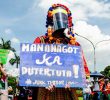DAVAO CITY, Philippines – A network of alternative media gathered for two days in Quezon city to discuss their role and the challenges they would be facing under the administration of President Rodrigo Duterte.
Altermidya, People’s Alternative Media Network is a network of independent and progressive media outfits, institutions and personalities across the country.
Former University of the Philippines Diliman College of Mass Communication and Altermidya Chairperson Dean Luis Teodoro said the role of alternative media is to report with analysis on what is happening in the country.
“That includes what is the government doing,” Teodoro said last Oct. 12.
He described Duterte’s administration as “strange,” pointing to some of the President’s peculiarity, flip-flopping statements and unpredictable moves.
“First there is the opening of peace talks, then the announcement of independent foreign policy, and more initiatives,” he said.
“It means, there’s a support to progressive policies; genuine land reform, and national industrialization,” he said.
Because of this “strange” character, Teodoro said, “maybe it should be proper that alternative media should provide critical report.”
“And to criticize policies that we think that is not progressive or regressive,” he said.
Teodoro said the reports on the police’s actions in its campaign against illegal-drugs which resulted to a thousand of killings are used by international media to implicate Duterte as the brain behind the killings, suggesting that he should be ousted from office.
“We know that there is a big buzz of overthrowing Duterte,” Teodoro said. “The alternative media should provide analysis and criticism and point out what is the danger of this.”
Altermidya National Coordinator Benjie Oliveros pointed out that the role of media outfits under the network is to monitor and write commentaries on policies of the Duterte administration which affects the people.
“Because of the opportunities like peace talks, and other declaration like the independent foreign policy, the discourse of these topics are placed in the public,” Oliveros said, referring to discussion on the Enhanced Defense Cooperation Agreement and the Visiting Forces Agreement.
“Discussions on peace talks, land reform, and other important issues that would benefit the people would be the role of the alternative media,” he said.
“We will explain to the people about these issues,” he added.
Saying that such task is “challenging,” Oliveros said there is a need to explain the contexts of Duterte’s pronouncements and how it will advance the people’s interest. “It is possible to broaden the role of alternative media today.”
Challenges
The fast exchange of information across the new media platforms is one of the challenges that was recognized by Oliveros.
“Here goes information that Duterte meets the progressives,” Oliveros said. “From that we could do a research and explain the implication of this [meeting].”
Apart from appointing Leftist cabinet members, Oliveros sees Duterte’s administrative order on Freedom on Information as positive.
“This (FOI) needs to be a law,” he said. “And to review, if this will widen or narrow down the information [dissemination].”
Meanwhile, for Teodoro, the challenging part for the alternative media to do would be on explaining and giving context about the government policies’ impact to the people.
“We need to explain why there is a need for land reforms and national industrialization,” Teodoro said, noting that “corporate media is not giving attention to it.”
On peace negotiations, Teodoro said the corporate media only reported that there is an on going talks in Oslo but, “they [corporate media] are not reporting on what is being discussed.”
“I think those are the challenges. Reporting needs to be in-depth in this period of time,” he said. (davaotoday.com)










